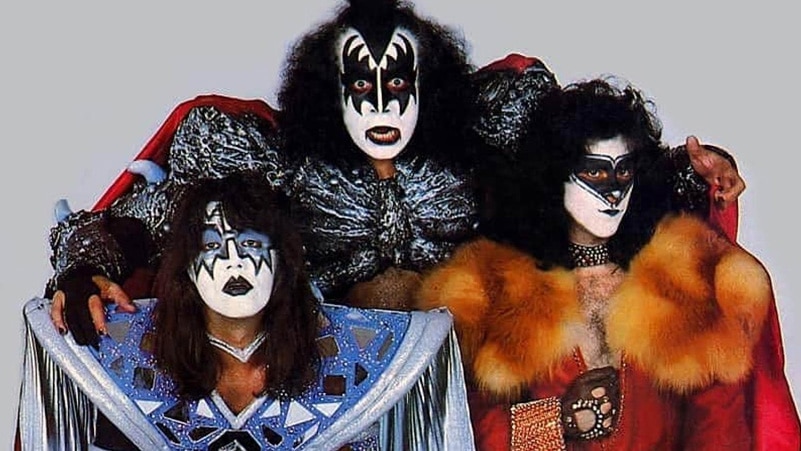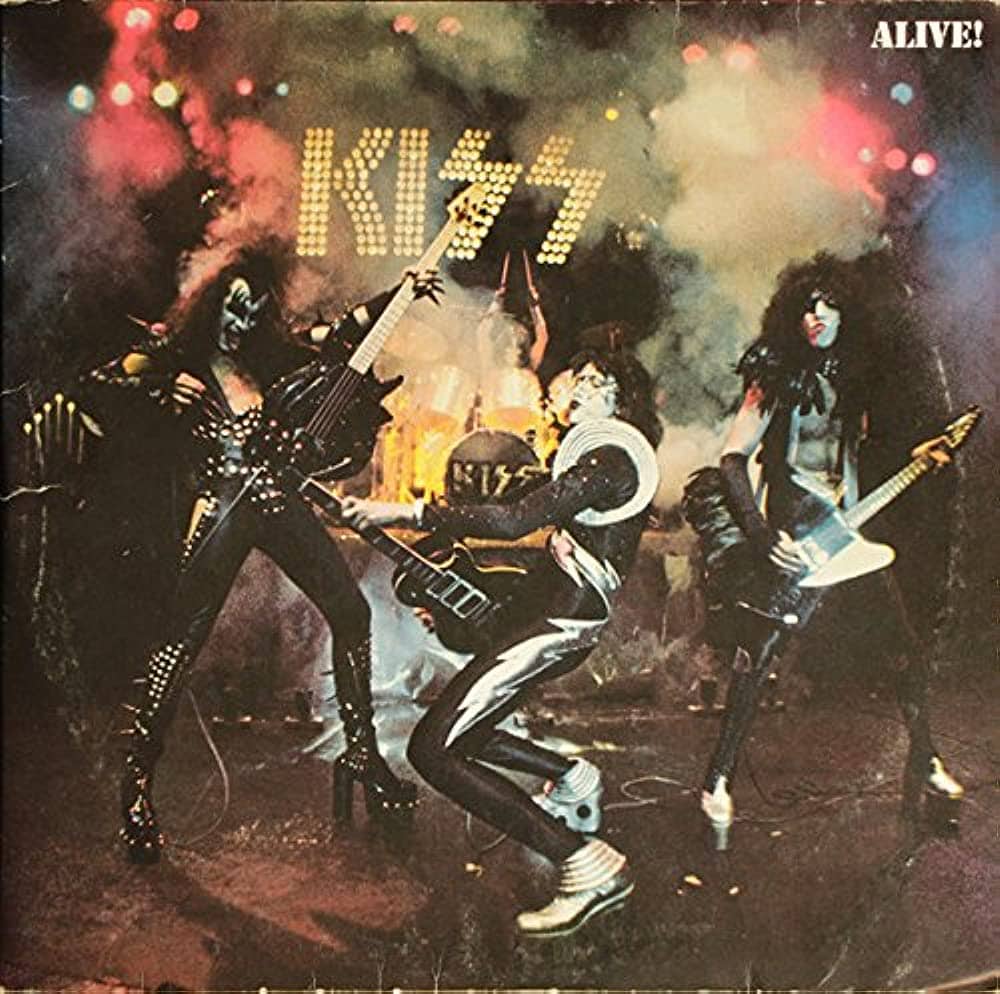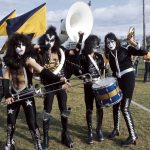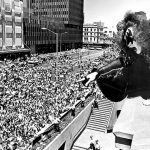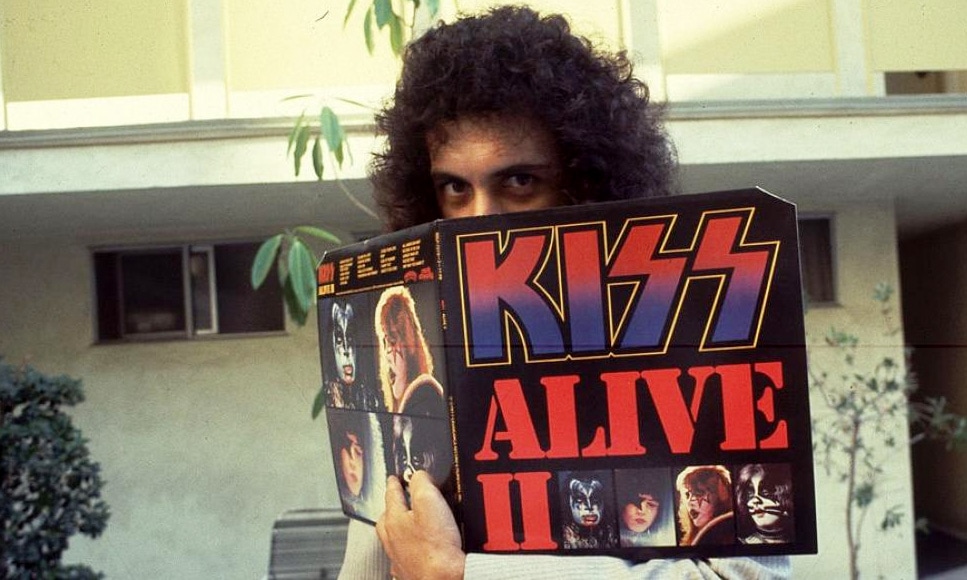On July 24, 1980, the People magazine Kiss photo shoot with photographer Raeanne Rubenstein took place. This was the first photo session with the new drummer Eric Carr.
The photo was on the cover of People Magazine August 18, 1980.
Here’s the original article from People.com:
“We’re the culture heroes of our day,” boasts Gene Simmons, Kiss’ bassist, fire-breather and outrageous mouthpiece. “When people talk about the music of the ’70s, they’ll talk about Kiss.” Simmons may be keeping his tongue in cheek for once, but it is true that no other group better summed up the ’70s music scene. It was an era noted for often lurid excess and a phenomenal growth rate— and the primacy of exotic packaging over esthetic accomplishment. In any case, no other band has more to show for its fusion of cosmetics, pyrotechnics, heavy metal and even heavier merchandising. Kiss’ 16 LPs sold 40 million copies in six years and, throwing in concert tickets, logo-laden lunch boxes, pinball machines, comic books et al, manager Bill Aucoin puts their decidedly gross national product at more than $100 million a year.
But the ’70s are history. The now recession-racked music industry is dominated by the no-frills naturalism of New Wave, and Kiss’ theatrical indulgences make its members look like dinosaurs to wishful critics. Perhaps sensing the inevitable end, the first of the charter quartet defected this spring. “I was losing the real me somewhere,” explained drummer Peter Criss, 34, “and it scared me.” For Kiss alumni there is, of course, an added dividend to the years of fanatically guarded cosmetic cover. Criss departed into anonymity and can spend his undoubted millions in the kind of privacy unavailable to other rock stars (like fellow drummer Ringo Starr).
Still, it’s easier to figure why Criss bailed out than to determine if he left a sinking ship. It is true that Kiss’ latest LP, Unmasked, has stalled on the U.S. charts after two months, yet, significantly, Criss decided not to sell out his percentage of the action. Kiss now moves more records abroad than in the U.S., and the spinoffs do spin on: A Saturday morning cartoon show, a line of makeup and the inevitable jeans are under consideration. Criss not only retained a share of those, but also was actively involved as the group checked out 2,000 replacement applicants for criminal records, drug problems and emotional stability, as well as skills on the skins. The winner, Eric Carr, 27, is a New Yorker like his three colleagues: Simmons, 31 (this month), and guitarists Paul Stanley, 28, and Ace Frehley, 29. As they packed (“Kiss travels with so many people, we could be a country,” says Stanley) last week for a tour of Europe, the foursome let down their masks for PEOPLE assistant editor Fred Bernstein.
Gene Simmons, the wag
Just last year Simmons was reveling in his “first real relationship ever” with the relationship-riddled Cher. Now he’s Supremely happy with Diana Ross, 36. “You live and learn,” says Simmons of his break-up with the ex of Sonny Bono and Greg Allman. He tried living with Cher in Malibu, but never adjusted to California because “there’s something sick about seeing Santa Claus in shorts.” He doesn’t drive either. When Cher was blackballed in her effort to buy a co-op in New York, Gene was dispatched to the Apple, where he convinced the owners of another apartment building to let him build a glass-walled penthouse on the roof—where he still expects Cher to stay on visits East. “I used my best English,” he explains, “and told them I hate drug-crazed rock stars who wear makeup.”
Ironically, it was Cher who introduced Gene to her old pal, Diana, at Ross’ New York pad last summer. Three months ago Gene followed Diana (divorced from rock manager Bob Silberstein) to Las Vegas, where they gambled in the giddy hours after her late show at Caesars Palace. They’ve also been to Colorado together (where Diana taped a Bob Hope special) and to her house on Martha’s Vineyard. Still, Gene says of Cher, “We’ll know each other forever.” As if to prove it, he’s finishing his penthouse to her flamboyant specifications, including what he describes as “Mesopotamian” doors and Doric columns in the mirrored front hall. Meanwhile Gene is living with Diana and her three daughters, but Cher isn’t jealous. Last month she flew to New York to accompany Diana to a Kiss rehearsal (“She’s turned into our biggest fan,” claims Gene). But he won’t go out in public with the two women because “that would be a field day for everybody’s minds.” Simmons is reluctant to discuss his affair with Ross because “the last time, the band got hurt by all the publicity.”
An only child, Simmons was born in Israel, but came to New York at 9, when his Hungarian-Jewish parents split (Gene recently bought a house in Israel for his carpenter dad, whom he hasn’t seen in 22 years). Gene’s mother, Florence, a concentration camp survivor, found work in a dress factory, while Gene learned English so fast he published his own science fiction magazines in high school. (He now speaks Hebrew, German, Hungarian and vulgar.) Keeping a promise to his mother, Gene finished Richmond College on Staten Island, then taught grade school English for six months in Spanish Harlem. But, unfulfilled — “No matter how good the lessons were, the kids never applauded” — he changed his name from Klein to Simmons (after the actress Jean), and started a band with acquaintance Paul Stanley. Then local rockers Criss and Frehley were recruited through classified ads in 1972 and 1973, and Kiss was on the road.
With a touring schedule of five months a year, Simmons claims to number his sexual exploits at over a thousand (most with his makeup on), and he’s not planning to slow down. “I’m selfish and I get bored easily,” he says. He thinks his appeal is that “women like men who talk dirty,” but his young following will be interested to know that Gene has lately been wearing braces to straighten his teeth. As for other interests, he plays racquetball with Stanley (“I slaughter him”), but avoids other rockers because “most are idiots.” The group’s self-described “egomaniac,” Simmons wears leather pants and silk shirts, and for now rules out marriage and kids. “If there were a husband test,” he admits, “I might not pass.” Diagnoses bandmate Frehley: “Sex is his weakness.”
Eric Carr, the rookie
“Three months ago,” recalls Carr, Kiss’ new drummer, “I was really at the end.” After 10 years with the same New York club band, Eric says, “I was just at the point where I didn’t think I had the energy to push.” Still, Eric sent Kiss a demo tape and a bio “typed on two fingers.” Carr doesn’t have a percentage yet, but his first-year salary, according to Gene, “is an enormously high six digits. He didn’t ask for anything,” Simmons adds, “he just wanted to play.”
The Brooklyn-born Carr shares a pad there with his girlfriend of four years, a Donna Summer lookalike who sings with a New Wave band on Long Island. Eric hopes to maintain his laid-back lifestyle, which includes drinking 7 & 7s and watching Saturday morning cartoons. Not that he has much time. In less than a month Carr had to master Kiss’ entire repertoire on Criss’ mammoth drum set and to develop a stage persona. Criss’ feline face was retired. “I become the fox,” says Carr, “because I’m wily.” Aside from costume fittings (his has a real fur collar), it took more than 60 hours to design the makeup that Carr is still learning to apply. He even had to dye his hair jet black to eliminate highlights. “The pressures are high,” he concedes, “but the more I do, the more I get into it.” Observes new colleague Frehley: “I don’t think Eric knows what he got himself into.”
Paul Stanley, the spender
“When I met Gene, I thought he was pompous and opinionated,” remembers rhythm guitarist Stanley. But at 6′, even without the spangled eight-inch heels he sports onstage, Paul hardly feels overshadowed. “Being in Kiss,” he insists, “is like being a solo performer—all of us can get our kicks.” Stanley dated Cher’s ex-soap actress sister, Georganne (General Hospital) LaPiere, while Gene went out with Cher. Paul, a Queens native whose real name is Stanley Eisen, also asserts his individuality by wearing a gold hoop through his left ear, a diamond-encrusted Rolex watch and “closets full of clothes. There’s nothing romantic to me about being a starving artist.”
He needn’t worry. Paul is into shopping (one recent acquisition: a $60,000 Tiffany lamp), sushi (“red meat makes me sluggish”) and discos. His vast new duplex on Manhattan’s East Side is still being decorated, though the Jacuzzi whirlpool is already in. It accommodates six, he says, “if they’re real good friends.” The only thing Paul brought along from his old place was the bed “because it has lots of good memories.” In that apartment, a neighbor sued him for playing music too loud, but most nights Paul just watches Mary Tyler Moore reruns or spins around in his burgundy Mercedes from 3 to 8 a.m. He doesn’t mind blind dates (“If your friends know you, they know what you like”), but he complains that girls expect someone weirder. “Deep down,” he says, “we’re still everyday guys.”
Ace Frehley, the daddy
“Ace plays a lot dumber than he is,” allows Simmons, but as a kid, Kiss’ lead guitarist didn’t care much for education. “My gang was the toughest in the neighborhood,” recalls the Bronx-born Paul Frehley. “We went hunting with bows and arrows in the park. A couple of my friends OD’d. One hung himself in jail.”
As he speaks, Ace walks around his Connecticut mansion. The fireplace is decorated with 20 tons of quartz from Arizona. There are rare 1940s jukeboxes and a collection of 125 guitars in the playroom. “Some of them,” he says, “are worth ridiculous amounts of money.” Outside are a Mercedes, a Cadillac and a Corvette. On his finger is a 38-diamond ring that spells out “ACE,” a Christmas gift from his wife of four years, Jeanette.
The pièce de resistance of his four and a half acres is the state-of-the-art recording studio Ace had built, bunker-like, in the hill behind his house. “I just dropped half a million dollars into it,” he says. The idea is for Kiss to record there, so Ace can spend more time with Jeanette and his month-old daughter, Monique (Ace almost vetoed the name because “It’s too hard to spell”). “I’m feeling guilty about going off on tour,” he says, noting that groupies “are an occupational hazard.”
Though she has two maids, Jeanette still cooks Ace’s favorites, like spaghetti. At night they play Yahtzee or Othello (he usually wins). Sometimes Ace stays over in his New York pied-à-terre or goes out with showbiz heavies like John Belushi (“He opened his private bar for me one night and we got pie-eyed”). But he’s just as happy working on one of the gas-powered, radio-controlled model helicopters he flies in the backyard or fishing in the private pond he just had stocked with bass.
His solo album was the only one of Kiss’ four cut in 1978 to produce a hit single, New York Groove, and now Ace, a first-rate heavy metallurgist on guitar, is asserting himself more around the band. “I’m starting to come out of my shell,” he says, “and I’m going to get stronger.” Is he worried about Criss’ replacement? “I don’t know how fans will react to a new drummer, but I got my fingers crossed.”
No matter how popular Carr proves, the terse realism of the new rock could mean the decline of florid escapism and the death of Kiss. But, you parents out there who are fed up with handing over $10 bills for Kiss concerts and LPs, it’s much too soon to get your hopes up.

